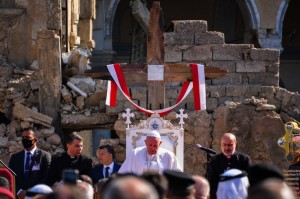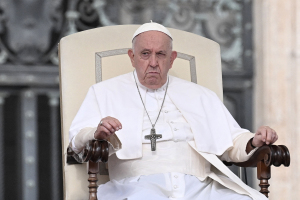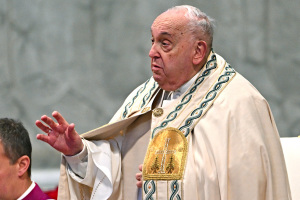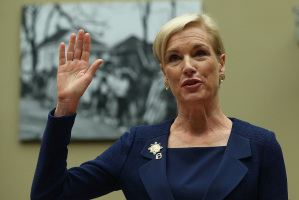Q&A: WEA Leader Geoff Tunnicliffe on Syria Conflict, Roma Downey, Jordan's Role in Mideast Christian Crisis
The head of a global evangelical organization that represents over 600 million Christians worldwide is calling for global action to help stem the refugee crisis in the Kingdom of Jordan.
Geoff Tunnicliffe, chief executive officer and secretary general for the World Evangelical Alliance, told The Christian Post about the refugee situation on the Jordan-Syrian border. "There's a crisis here with the refugees. Imagine 30 million people arriving in the United States in the last six months as refugees. That's the kind of percentage of people that we're talking about that are now in Jordan," said Tunnicliffe.
"So you can imagine the strain that's on the government and the NGOs and so one of the things that we want to do is draw attention to this crisis and call upon our community to respond in a very significant way to help the refugees."
Tunnicliffe was in Jordan for a conference this week called by King Abdullah II that focused on the status of Middle Eastern Christians. Held in the capital Amman, the two-day conference featured prominent Arab Christian leaders from across the region.
Roma Downey and Mark Burnett, the husband and wife co-producers of the hit History Channel miniseries "The Bible," were present for the conference with Downey delivering remarks.
Tunnicliffe also gave a speech at the conference, saying Christians who are "loyal subjects in your country and those in other parts of the Arab world deserve to be treated respectfully and wtih honor."
The WEA head talked with The Christian Post on Thursday about the conference in Amman, the involvement of Downey and Burnett, and the pressing issues surrounding religious persecution in the region.
The following are excerpts from the interview.
CP: What made this conference in Amman important?
Tunnicliffe: It came at a very critical time. When King Abdullah called the conference a month ago, that was prior to the obviously the situation that we find ourselves with Syria now, with the potential of the use of chemical weapons and the potential of military intervention. Meeting together at this time with that heightened awareness of the issues I think it was very critical
CP: Why were Roma Downey and Mark Burnett part of the Conference?
Tunnicliffe: Mark and Roma serve as ambassadors for the World Evangelical Alliance and they're also personal friends of the King of Jordan. We thought it would be good to have them here because they bring a different perspective to this.
Their commitment to speak about Christian unity and also their passion is also for promoting freedom for all Christians. And so the combination of those were important reasons why we ask them to come along as part of our team.
CP: How do you believe this week's conference can influence the situation for Christians in the Middle East?
Tunnicliffe: First of all, I think it's a sense of solidarity between the Christian groups, recognizing that their voices are now beginning to be heard collectively and hopefully that they will feel affirmed for who they are and that they're not neglected.
King Abdullah called a global conference, to hear regional voices so I think that's important. I think it will lead to other initiatives which may be greater dialogue between Muslims and Christians in the region, seeking to resolve some of the issues. It's a part of a process I think, so hopefully this will be continuing to move the process along which acknowledges the challenges, serious challenges faced by Christians in the region.
When you think about Iraq, which has gone from 1.2 million Christians now to less than 150,000, I think there is great awareness the fact that Christians are leaving the region and that's really not good for the region. There needs to be a Christian presence in this region. Hopefully that message will get out.
CP: What changes have seen in the region from Jordan's advocacy for interfaith harmony?
Tunnicliffe: It seems to me that Jordan can play the unique role in the region. It's probably the only really stable country in many ways in the region at this point. And I think it's had a history of supporting Christians and at the same time being…majority Muslim. So I think they can provide a model for harmony for the region.
That's the message that King Abdullah can say to other leaders in the region. That there is a way of living in harmony between the different faiths without resorting to violence; I think they do provide a very significant model for the region.
CP: What is the World Evangelical Alliance doing to help persecuted Christians in the region?
Tunnicliffe: One is to acknowledge the fact that we know that they're there and under great pressure and part of our role is to be a megaphone for their voice on the global stage. Calling for prayer and assistance for the Christians that are in the region.
We have several mechanisms that we use to deal with the issues of persecuted Christians. One is the United Nations, our official representation there. So we can highlight some of the concerns we have for our own community. I think there are some specific concerns that we have for evangelical Christians in the region and that is in a number of countries. The evangelical Christians don't have the same recognition as the other churches. So we're encouraging all the different countries to fully accept the evangelical churches just as they do the other churches. And so that's a very specific issue that we've been working on and encouraging governments to take a stance.





























